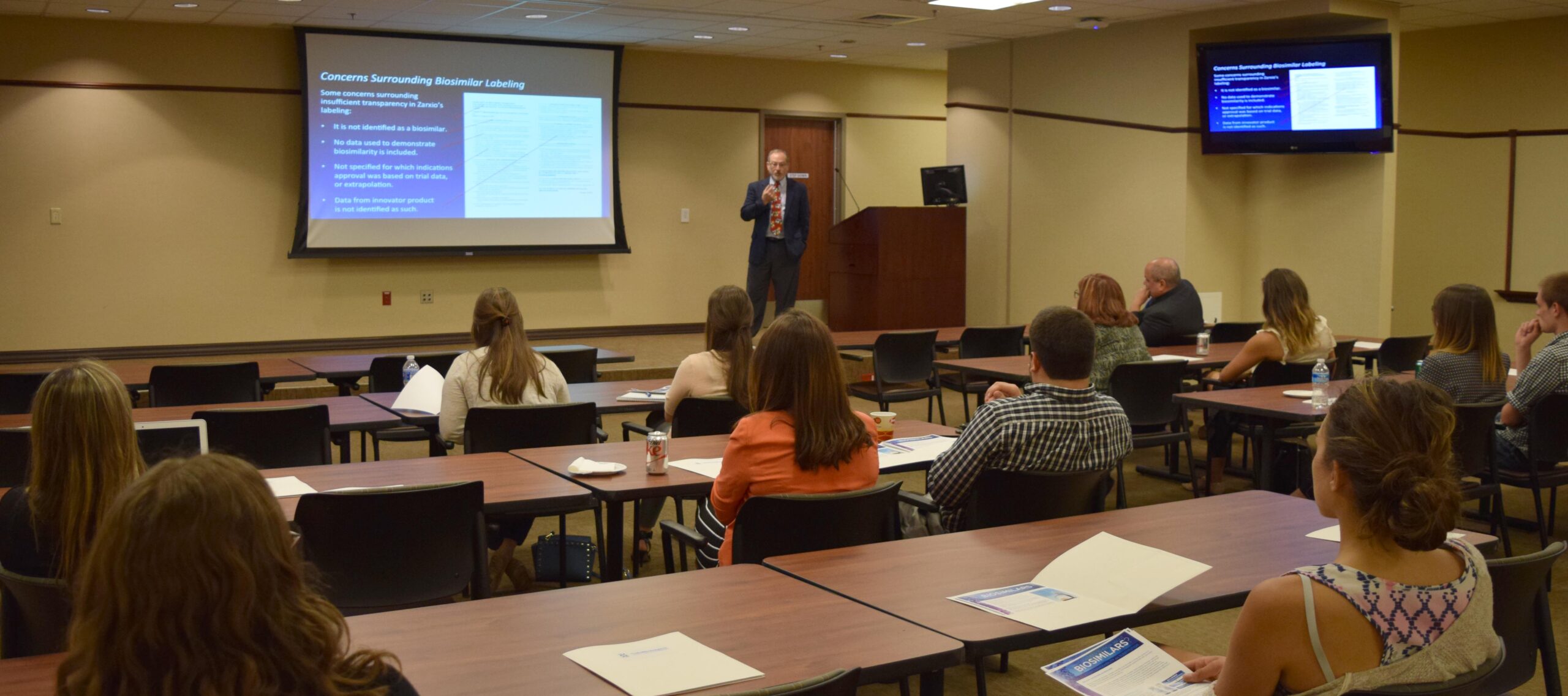On Wednesday, June 15th, ASBM presented a one-hour educational program entitled “Biosimilars: New Choices, New Challenges” at TriStar Centennial Medical Center in Nashville, TN. Tristar Centennial educates pharmacy students from Belmont University, Lipscomb University, Murray State University, and the University of Tennessee, and the audience was comprised of 20 pharmacy students from these schools as well as nurse-practitioners and other health care providers from the Medical Center.
ASBM Chairman Harry L Gewanter, MD began the program by presenting the students with an overview of biologic medicines, in particular their extreme complexity and sensitivity to manufacturing and environmental changes, along with their potential to cause unwanted immune responses. A biosimilar, he explained, is not an exact copy of a biologic medicine, but rather a new molecule reverse-engineered to mimic the therapeutic properties of the original, but made from a its own cell line and through different processes. Thus, it can only ever be similar to, not identical to, its reference product.
These concerns, Gewanter explained, necessitate treating biosimilars differently from generic versions of traditional chemical drugs, leading policymakers at the state, federal and international level to update their regulations.

For example, clear product identification is critical when dealing with similar medicines. Dr. Gewanter discussed the naming plans created by the World Health Organization and FDA, and how these can help physicians and pharmacists accurately track which medicine their patient receives. He noted that distinct names were supported by physicians and pharmacists, citing ASBM’s survey data.

Another area of concern among physicians and pharmacists was product labeling. Dr. Gewanter explained. He discussed the importance of informative labeling for physicians and pharmacist when deciding between similar medicines, and showed ASBM survey data indicating that providers want far more transparency that the FDA required with its initial biosimilar approval. Gewanter also discussed the FDA’s first recent FDA Draft Guidance, which begins to address some, though not all of these concerns. He pointed to the product labeling requirements in Canada as a potential model. Health Canada requires much more data on a biosimilar (referred to in Canada as a Subsequent Entry Biologic or SEB), including whether it was tested in a given indication or approval was granted based on extrapolation from testing in another indication.
Finally, Dr. Gewanter emphasized the importance of physician-pharmacist collaboration and communication when dealing with the substitution of biosimilars. In order to make informed treatment decisions and accurately track patient response, it is critical for pharmacists to let physicians know when they have substituted a biosimilar, and for physicians to have the authority to block a substitution they felt was medically inappropriate by designating “dispense as written”(DAW) on the prescription.

Dr. Gewanter praised Tennessee’s lawmakers for their leadership in enacting legislation shortly after the first biosimilar was approved last year, that required this communication between pharmacist and physician, and allowed physicians DAW authority.
 Like similar laws being passed nationwide, the Tennessee law permits only interchangeable biosimilars- those determined by the FDA to provide the same effects as the original product without causing additional risks to the patient if switched – to ever be substituted.
Like similar laws being passed nationwide, the Tennessee law permits only interchangeable biosimilars- those determined by the FDA to provide the same effects as the original product without causing additional risks to the patient if switched – to ever be substituted.

Next, Andrew Spiegel, Executive Director of the Global Colon Cancer Association, spoke on the patient perspective on biologics and biosimilars. Mr. Spiegel praised biologic medicines for their role in tripling the life expectancy of patients diagnosed with colon cancer. Biosimilars, Mr. Spiegel emphasized, hold great promise for patients- offering new therapeutic options and doing so at lower cost. However, he cautioned in order for benefits of biosimilars to be realized, physicians and patients must have confidence in them. This requires transparency, particularly about whether or not the biosimilar was tested in a particular disease.
Mr. Spiegel described his experience testifying at a recent FDA hearing, where committee members were given an “all or nothing” choice: approve a biosimilar for all the indications for which it applied, or none at all. In several of the indications, its biosimilarity to the innovator have been well documented, while in others, it had not been tested and there had been global disagreement among regulators and physicians as to whether it should be approved. This “all or nothing”approach is worrying, and does not serve the interest of patients, Mr. Spiegel argued.

Finally, Mr. Spiegel emphasized the importance of the ultimate treatment decision being made by the patient and physician, rather than a third-party payer. “Treatment decisions, including the decision to switch from one medicine to another should be made for medical reasons, that benefit the health and safety of the patient, not for non-medical reasons that might benefit a a company’s shareholders”, said Spiegel. He then outlined practices that payers may use to force a patient to switch to a non-interchangeable biosimilar, such as changing their medical coverage or health care premiums.
Afterward, Dr. Gewanter and Mr. Spiegel took questions from the audience, several of whom are pharmacy students and residents currently receiving training in specialty pharmacy, who remarked found the talk very informative and relevant to their current work.

Dr. Gewanter answers a fourth-year pharmacy student’s question about biologic substitution.

Mr. Spiegel discusses step therapy and other payer practices with a nurse practitioner.
